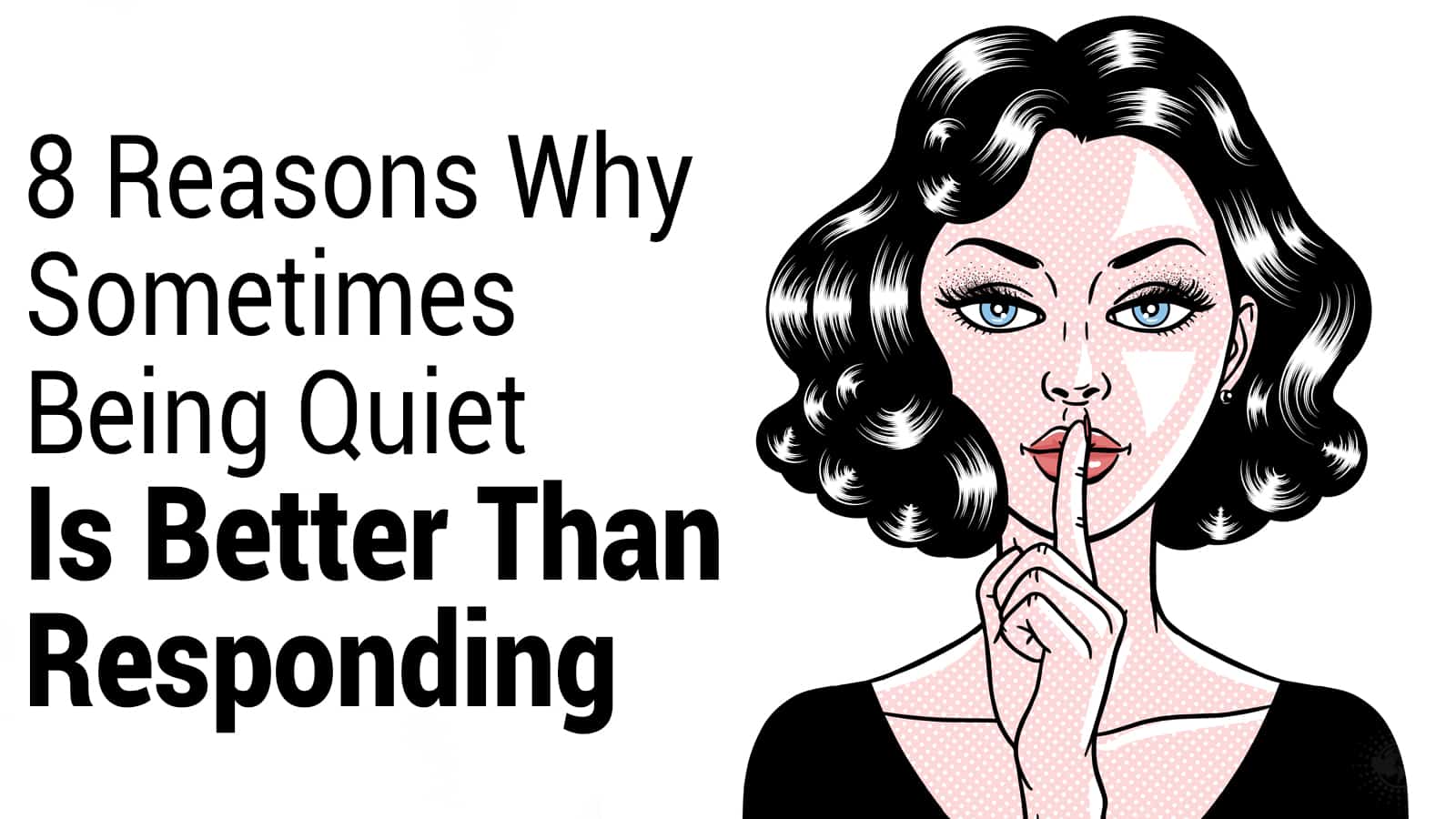Talking is as normal and frequent as breathing, but there are plenty of times when you should shut up for the best results. That’s right: the solution isn’t always coming up with a great argument, but instead not saying anything at all. It’s difficult to accept at times and hopelessly uncomfortable at others, but it can give you the upper hand. Here are eight reasons why sometimes being quiet is better than responding.
1. Insults Don’t Warrant A Response
Insults hurt, and what’s worse is not knowing how to respond. Instead of tying yourself into knots figuring out what to say, let it slide. Being quiet keeps you on the moral high ground.
· Don’t Feel Bad
You’re not obligated to indulge people if there isn’t a constructive way to answer them. They’re putting you on the defensive, flustering you as you try to prove your worth. You might feel bad for ignoring them, but they probably wouldn’t have taken your words seriously.
· Shut Down Insults
Don’t insult people back, or you’ll encourage further insults. To stop things in their tracks, use non-verbal cues that show you’re uncomfortable. You can sigh, shrug, roll your eyes, shake your head, and more to shut down the toxicity. They’re vulnerable to your response when they realize they’re not getting anywhere.
· Give Them Something To Think About
Your silence is wielded as a weapon. After the confrontation, the others will remember that you said nothing. This can force them to consider whether they regret what they said. It could help them realize they need a different approach and may even bring them to an apology.
2. People Don’t Always Listen
We’ve all had conversations where others have talked too much. Being repeatedly cut off or talked over as you try to get a word in is dispiriting. Deemphasize ordinary discussion in these situations so that you can gain from listening.
· Understand The Conversation
Instead of exhausting yourself trying to be heard, get a handle on why others are talking at all. If they’re rambling and asking many rhetorical questions, they might be getting things off their chest, so there will be little for you to add. Let them have their time if you think they need it.
· Spare Yourself The Trouble
If others aren’t listening to you, it’s not your responsibility to listen or respond. They may notice if you’ve been quiet for a while, at which point you can say you weren’t paying attention. That momentary embarrassment could help them take you more seriously. Since no one likes to talk at length without paying off, they might realize it isn’t fair to drown you out.
· A Learning Experience
If you can’t talk, observe. You can learn much about people by letting them run their mouths for a while. Nod for encouragement and watch them pensively, allowing them to reveal who they are. The insight gained could assist in mutual understanding during future conversations.
3. You Need Time To Think
As a rule, saying nothing can be better than saying something silly. You usually can’t just fall silent in a one-on-one conversation, but you have leeway in group settings. Everyone deserves time, so don’t think you have to respond right away.
· Ignore The Pressure
We live in a society where not responding is taken as evidence of incompetence. When they’re trying to prove themselves, people blurt out things they regret. If someone tells you to weigh in, deter them with a simple shake of your head. Looking unprepared is worthwhile if it means you can come up with something good to say.
· Be Mentally Present
When you’re on auto-pilot, you can end up talking for the sake of talking. That’s how people say what they don’t mean, exaggerate, and bring up pointless anecdotes. Sometimes to be present and optimistic about what you’re doing, you need to stop talking, even if it means not contributing to the discussion.
· Be Fair To Yourself
It’s not always true that you should talk to make doubt and anxiety disappear. Research shows that people tend to attribute the worst moments of talking, like awkward pauses and conversational missteps, to themselves and not others in the group. Being quiet can curb that worry, letting you first psych yourself up with positive thinking.
4. Listening Is Respectful
Sometimes people aren’t looking for a response, even when it seems they are. They might want an emotional release. It can support prioritizing listening over speaking, relying more on body language than words.
· Watchful Waiting
It can be tempting to start talking, but sometimes you should only speak when asking a question and then go back to listening. People often don’t want to hear your solutions and want you to sympathize with their story. Validate them, so they’re more positive about hearing you speak next. As researcher Dr. Ralph G. Nichols said, one of the most basic human needs is to be understood, and the best way to understand people is to listen to them.
· Process What You Hear
Thinking of what to say takes away from processing what’s being said to you. It’s rewarding to turn over what you hear in your head, even when you think there’s an opening to speak. Please pay attention when someone expresses themselves since what they divulge could be useful later.
· Empathetic Listening
Researchers say you should clear away distractions like phones and make appropriate eye contact to act as listeners. Nod periodically and vaguely mouth words you hear. This will signal to the speaker that they’re being taken seriously and will change how you feel inside, making you a better listener.
5. People Aren’t Always Fair
When people aren’t acting in good faith, you owe them nothing. If you think any response will be manipulated and used against you, saying nothing is in your best interest. Please don’t stoop to their level.
· Thwart Their Tricks
People might say things to get a rise out of you, getting you frustrated so they can badmouth you later. They might tell you to prove something isn’t true when they’re burdened with proving their claims. They might condescendingly ask loaded questions or questions they know you do not know of. Ignore them, so they have to say something sensible.
· Be Better Than Them
If you let others keep talking, they can dig their own grave. If you start responding, you might not realize how angry you’re getting, which could escalate. A simple “I won’t comment until you act mature” will do, then fall silent and fill yourself with positive thinking. The responsibility falls to your intimidators to make things right. They can’t seriously claim it was your fault that things fell apart.
6. Take Some Control
Silence can be powerful. In a world where we talk all day, every day, nailing the moment to be quiet is a show of strength. You have to fight through the awkwardness of it.
· Play Hardball
Author and business expert Jim Schleckser explains how silence can give you leverage during negotiation. If a person makes an offer and you don’t say anything initially, it’ll pressure them to be convincing. They may offer you more money to convince you you’re getting a good deal. Agree to some conditions but stay silent on others to agonize them further.
· Suss Them Out
Silence is an intimidation tactic. People get antsy as they lack talking gnaws at them, making them want to fill the quiet. In frustration, they might just come out and say what they think, hoping to shock you so you’ll respond. The quiet can also trick people into thinking you know more, making them more respectful.
· Maintain The Right Demeanour
You don’t have to respond to everything to get along. Talking too much can make you seem superficial, so keep your finger on the pulse. You can safely ignore some statements and even questions if you want to be taken seriously. People will learn your time is not to be wasted.
7. Know When It’s Enough
There’s a time and place for everything, and talking is no exception. To survive life with any confidence, you must know when to cut yourself off in critical social situations. If you don’t, it’ll interfere with your personal growth.
· Don’t Drag Things Out
People tend to want the last word in specific conversations. Don’t bother because repeatedly adding a new thought drags things out when you could have moved on. You never know how long you could be stuck meandering, especially with someone else who won’t let it go. If you’re unsure how to end a conversation, wait until someone says something ignorable. Then fall silent and shrug at any attempt to get you talking again.
· Take Responsibility
Good rapport involves knowing when to stop talking so that opinions can be heard, even if you’re critical of what’s being said. Research shows that listening with empathy is one of the most vital aspects of communication for influential leadership, especially retaining those subordinate to you. And according to Dr. Nichols, as people improve their listening skills, they also strengthen their persuasion skills.
8. Don’t Get Involved
Sometimes you need to be quiet not to get involved in a snafu. Though you may want to run your mouth, you’ve got to think of the consequences. These situations call for positive thinking to keep you balanced.
· Don’t Get Intimidated
Don’t insert yourself into an argument you’re overhearing until you’ve heard enough. Also, be careful about responding to an arguer who’s trying to rope you into a confrontation with someone else. There’s nothing wrong with standing up for what’s right, but you may have to be quiet before you can get all the facts.
· Consider Their Needs
Sometimes it’s someone else’s time to speak. You might hear something outrageous, something you think warrants a rant. But don’t presumptuously start talking when it’s someone else’s concern. That person might not want you to fight their battles or might not think you know what needs to be said.
· Runaway Emotions
What may seem manageable can soon bring out the worst in you. If you’re too emotional, you’ll look foolish and say things you regret. Remember that it can be difficult to be convincing when raw feelings cloud your judgment. Stay positive to cool yourself off.
Final Thoughts On Some Reasons Why Being Quiet Sometimes Is Better Than Responding
Since everything in life revolves around talking, it can be agony-inducing not to know when to stop. But it’s a life-long skill that you have to work at. Keeping quiet will protect you from unsavory characters and honor people who are good to you. People are more than just their words.

















 Community
Community

